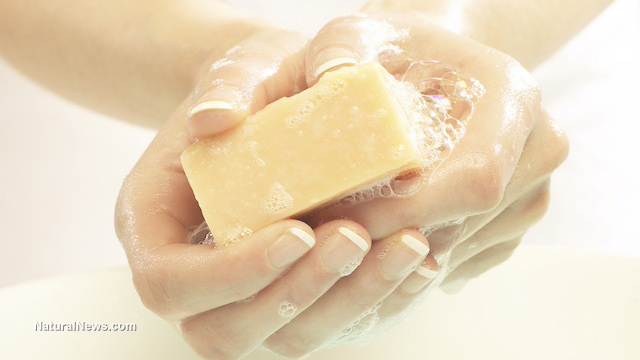Illinois bans soap containing plastic microbeads
Tuesday, June 10, 2014 by: Lance Johnson
Tags: plastic microbeads, Illinois, water pollution

- Newly released JFK files reveal Pentagon's role in creating Lyme disease and covid in the same lab
- Trump nominates VACCINE ZEALOT Susan Monarez to lead the CDC, sidelining RFK Jr.'s reform efforts
- Obama accused of laundering USAID funds to fuel global protest movements, regime change operations
- HUGE: Putin claims 2020 election fraud in U.S. sparked Ukraine war, calls for peace talks with Trump
- Deep State in disarray: Trump's funding freeze sows chaos, Democrats vow legal battle
- Trump shows his true colors
- STARDUST, a secretive Israeli-US startup, plans risky solar geoengineering experiment to BLOCK OUT THE SUN
- Trump's greatest betrayal so far: Accelerating Middle East wars, silencing dissent, and serving Zionist masters
- $2B Roundup verdict: A landmark blow to Bayer and a win for health freedom
- Outrageous government fraud: $312M in COVID loans went to children as young as 9 months old
- Festive flavors: The sweet history, nutritional profile and health benefits of pecan pie
- Elon Musk: Aliens could be here on Earth RIGHT NOW
- Dr. Mike Yeadon releases 15-minute testimony - WATCH - about genocidal intent of COVID “vaccines”
- SWEET SABOTAGE: CIA's secret war on Soviet sugar revealed in JFK files
- “Forever chemicals” in drinking water drive alarming cancer surge, new study warns
- A mysterious startup is developing a new form of solar geoengineering
- Govt. agency closed by DOGE looked like a palace inside, with oil paintings fit for a KING...
- “Behind the Green Mask”: Rosa Koire exposes the hidden agenda of UN Agenda 21
- Newly released JFK files reveal Pentagon's role in creating Lyme disease and covid in the same lab
- Elon Musk: Aliens could be here on Earth RIGHT NOW
- Reclaim your health: How midlife exercise reverses years of inactivity
- Trump reverses course on Gaza plan, says “nobody is expelling Palestinians”
- EPA advisor admits the agency is funneling billions to climate groups ahead of Trump’s return to White House
- Big Pharma's $8 Billion bribery scheme exposed: how doctors are pushed to prescribe junk science, not heal
- Space war brewing? Russia threatens to destroy Starlink satellites
- A lack of integrity in Academia: Harvard professor found GUILTY of fraudulent research to promote CRT theory
- Survival 101: Effective EMF blocking techniques
- Rep. Nancy Mace introduces bill to ban biological males from female facilities on federal property
- Mike Adams Sermon 66: God will DESTROY ISRAEL for its wickedness
- Pilots report mysterious lights 'moving at extreme speeds' across Oregon skies
- 5 Simple steps to boost your brainpower: How to strengthen executive function in a distracted world
- Historian warns Israel may be entering an “IRREMEDIABLE DECLINE”
- Florida takes a stand: DeSantis proposes permanent ban on mRNA vaccine mandates
- RFK Jr.'s SSRI antidepressant investigation sparks liberal meltdown, exposes Big Pharma's dangerous game
- OpenAI whistleblower who dissented against how the company trained ChatGPT found dead
- Sugarcane extract superior to cholesterol-lowering drugs?
- EPA advisor admits the agency is funneling billions to climate groups ahead of Trump’s return to White House
- The Health Ranger releases “Vaccine Zombie” song and music video, using AI-animated zombies for the music video
- California's social media censorship law struck down: A victory for free speech or a threat to online safety?
- Dr. Mike Yeadon releases 15-minute testimony - WATCH - about genocidal intent of COVID “vaccines”
- The pandemic as a tool for INDOCTRINATION: Understanding “The Indoctrinated Brain” by Dr. Michael Nehls
- Mike Adams releases country western hit single: Goin’ Back in Time is Comin’ Home
- Mike Adams releases music poetry sensation: A Child of God
- RFK Jr. clears key hurdle: Sen. Susan Collins backs controversial HHS nominee, signaling a new era for health policy
- Florida takes a stand: DeSantis proposes permanent ban on mRNA vaccine mandates
- Unpacking the Lies That We’ve Been Fed – new song and music video released by Mike Adams, the Health Ranger
- Mike Adams releases new song and music video: Nothing More Disgusting Than a Globalist
- Congratulations to the FULLY UNVACCINATED as you resisted the COVID-19 PROPAGANDA MACHINE fueled by over $100 BILLION
- “Why we influenced the 2020 elections”: Facebook files reveal the coordinated effort to bury the Hunter Biden laptop story
- Michigan sheriff announces criminal investigation into 2020 election crimes, Dominion Voting Systems
- Israeli soldiers accused of even more torture and abuse in the West Bank
- Migrants are taking advantage of recent hurricanes to scam residents and loot their homes
- House Intelligence Committee calls for the ARREST and PROSECUTION of Dr. Anthony Fauci
- Peter Rost exposes Big Pharma corruption in his book “The Whistleblower: Confessions of a Healthcare Hitman”
- Red Cross issues warning to stop blood plasma donations from vaccinated people
- Scientists confirm: GENIUS brain function can be spontaneously unleashed in humans without any apparent cause
- EPA advisor admits the agency is funneling billions to climate groups ahead of Trump’s return to White House
- HYSSOP: What research reveals about the health benefits of this ancient holy herb
- Two containers with completed ballots fall out of truck in Florida
- Fully vaccinated about to see “tsunami” of illness and death, warns virologist
- Global leaders unite to clamp down on “misinformation” with UN-backed Cascais Declaration
- BREAKING: 2025 NDAA authorizes mandatory military draft of WOMEN across America… as Pentagon pursues global NUCLEAR war with both Russia and China at the same time
- Michael Yon warns of a ZIONIST TAKEOVER in Trump’s second administration
- BOMBSHELL: DNA testing kits are a SCAM to develop ethnic-specific bioweapons
- Ozempic and Wegovy weight loss drugs are injectable LIZARD VENOM PEPTIDES that may unleash a devastating wave of organ failure… side effects align with symptoms of SNAKE BITES
- Israeli soldiers accused of even more torture and abuse in the West Bank
- These 13 countries just signed an agreement to engineer a global FAMINE by destroying food supply
- NASA admits that climate change occurs because of changes in Earth’s solar orbit, and NOT because of SUVs and fossil fuels
- RFK Jr. clears key hurdle: Sen. Susan Collins backs controversial HHS nominee, signaling a new era for health policy
- Sermon 30: How Jesus reveals Caesar’s FAKE CURRENCY and FALSE AUTHORITY
- Coriander seeds: Ancient medicine backed by modern science
- Arizona officials claim Maricopa County needs 10-13 days to tabulate results of the election
Illinois officially became the first state to ban microbeads in cosmetics products, setting a new standard for cleaner body care products and environment. The law prohibits the manufacture of microbead products by the end of 2018, ultimately phasing out sales by the end of 2019.
"Banning microbeads will help ensure clean waters across Illinois and set an example for our nation to follow," Quinn, a Chicago Democrat, said in a statement. "Lake Michigan and the many rivers and lakes across our state are among our most important natural resources. We must do everything necessary to safeguard them."
Similar bans are now being considered in New York and California.
Microbeads are consumed by fish, passing plastic bits into humans
The new Illinois law is backed by environmental experts who have measured considerable amounts of these plastic microbeads in waterways. These synthetic beads are consumed by fish, which destroys the physiology of aquatic life. The fish, in turn, pass the plastic to humans. These synthetic beads may cause inflammation and digestive issues.Sherri Mason, an associate professor of chemistry at the State University of New York, Fredonia, said, "They are about the same size as fish eggs, which means that, essentially, they look like food. To any organism that lives in the water, they are food. So our concern is that, essentially, they are making their way into the food web."
Microbead levels in Lake Ontario average 1.1 million per square kilometer
Mason was part of research team that spent two years collecting data on the amount of plastic microbeads in lakes. At half-hour intervals, the researchers sailed out with fine mesh nets that collected anything larger than one-third of a millimeter.For Lake Michigan, which touches Chicago, IL, Mason measured roughly 17,000 bits of microbeads per square kilometer. The highest concentration of plastic bits was in Lake Ontario, which averaged 1.1 million plastic particles per square kilometer.
Consumers are now being warned to look for polyethylene or polypropylene on product labels of exfoliating body care products. These two ingredients signify that the exfoliates are made out of plastic.
Companies begin seeking out natural exfoliates for their products
Karin Ross, a spokeswoman for the Personal Care Products Council, says that L'Oreal, Johnson & Johnson and Procter & Gamble are already on board with the new law, agreeing to phase out microbeads from personal care products. The companies are now reverting back to nature, testing out alternatives like apricot seeds, cocoa and pumice sand.Natural soap companies are already ahead of the game, using wholesome ingredients like oatmeal, walnut hull, sea salt, honey and others. Exfoliates help remove dead skin, giving soap both scrubbing power and cleansing strength.
Sources for this article include:
http://www.nbcchicago.com
http://www.npr.org
http://science.naturalnews.com
http://science.naturalnews.com
About the author:
Passionate about holistic wellness, Lance Johnson and his wife invite you to www.allnaturalfreespirit.com, where you can buy clean, chemical-free body care products.
Plastic microbeads at FETCH.news
Get independent news alerts on natural cures, food lab tests, cannabis medicine, science, robotics, drones, privacy and more.
Take Action: Support Natural News by linking to this article from your website
Permalink to this article:
Embed article link: (copy HTML code below):
Reprinting this article:
Non-commercial use OK, cite NaturalNews.com with clickable link.
Follow Natural News on Facebook, Twitter, Google Plus, and Pinterest
Science News & Studies
Medicine News and Information
Food News & Studies
Health News & Studies
Herbs News & Information
Pollution News & Studies
Cancer News & Studies
Climate News & Studies
Survival News & Information
Gear News & Information
News covering technology, stocks, hackers, and more



"Big Tech and mainstream media are constantly trying to silence the independent voices that dare to bring you the truth about toxic food ingredients, dangerous medications and the failed, fraudulent science of the profit-driven medical establishment.
Email is one of the best ways to make sure you stay informed, without the censorship of the tech giants (Google, Apple, Facebook, Twitter, YouTube, etc.). Stay informed and you'll even likely learn information that may help save your own life."
–The Health Ranger, Mike Adams












































